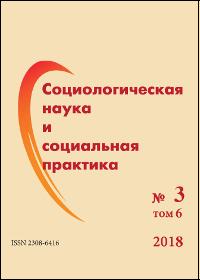Позиционирование России в мире на фоне внешних и внутренних угроз в оценках и суждениях россиян
Аннотация
Литература
Chugrov S.V. Ponyatie vneshnepoliticheskogo mentaliteta i metodologiya ego izucheniya. [The concept of foreign policy mentality and the methodology of its study]. Polis. Politicheskie issledovaniya = Polis. Political Studies.2007. № 4. P. 46–65. (In Russ.).
Kashin O. Ottepel'noe nastroenie. CHM–2018 kak obschenatsional'naya psikhoterapiya. [Thawing mood. World Cup 2018 as a nation-wide psychotherapy]. [Elektronnyy resurs]. Republic: [veb-sayt]. Elektron. dan. 25.06.2018. (Data obrascheniya: 01.07.2018). (In Russ.).
Krasin Yu.A. Metamorfozy rossiyskoy reformatsii. Politologicheskie syuzhety. [Metamorphosis of the Russian Reformation. Political science subjects]. Moscow: Institut Sotsiologii RAN, 2009. 496 p. (In Russ.).
Lapkin V.V., Pantin V.I. Krizis ukrainskoy gosudarstvennosti: politiko-pravovoy, tsennostnyy i geoekonomicheskiy aspekty. [The crisis of Ukrainian statehood: political-legal, value and geo-economic aspects]. Polis. Politicheskie issledovaniya = Polis. Political Studies. 2014. № 5. P. 68–69. (In Russ.).
Politicheskaya nauka pered vyzovami global'nogo i regional'nogo razvitiya: nauchnoe izdanie. [Political science before the challenges of global and regional development]. Ed. by O.V. Gaman-Golutvina. Moscow: Aspekt Press, 2016. 672 p. (In Russ.).
Rossiyskoe obschestvo i vyzovy vremeni. Kniga pyataya. [Russian society and the challenges of time. Book five]. Ed. by M.K. Gorshkov, V.V. Petuhov. Moscow: Ves' Mir. 2017. 427 p. (In Russ.).
Trenin D.A. Vneshnyaya politika Rossii v blizhayshie pyat' let: tseli, stimuly, orientiry. [Five-Year Outlook for Russian Foreign Policy: Demands, Drivers, and Influences]. [Elektronnyy resurs]. Moskovskiy tsentr Karnegi: [veb-sayt]. Elektron. dan. 28.04.2016. (Data obrascheniya: 01.07.2018). (In Russ.).
Yavlinskij G.A. Poterya buduschego. [Loss of the future]. Polis. Politicheskie issledovaniya = «Polis». «Political Studies». 2017. № 5. P. 133–155. (In Russ.).
ESS6–2012 Data Download. [Electronic resource]. Europian Social Survey. [veb-site]. Electron. dan. 2012. URL: http://www.europeansocialsurvey.org/data/download.html?r=6 (Date of access: 27.07.2018).








 Издатель: Федеральное государственное бюджетное учреждение науки
Издатель: Федеральное государственное бюджетное учреждение науки